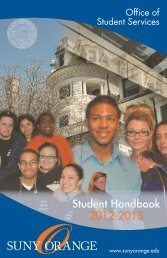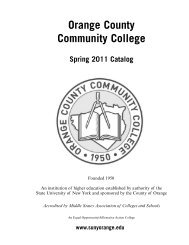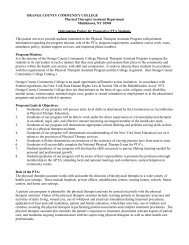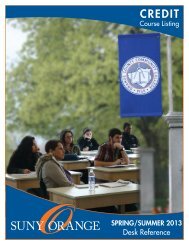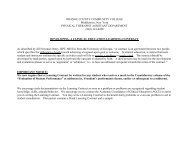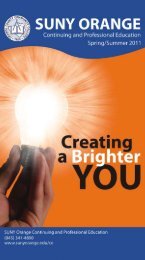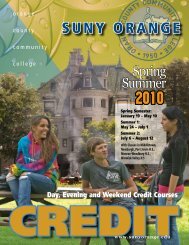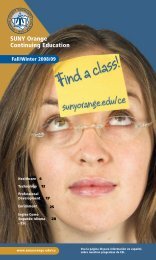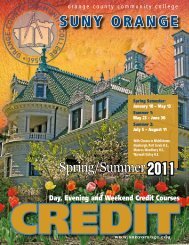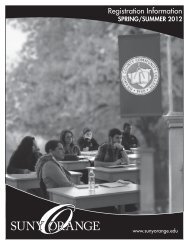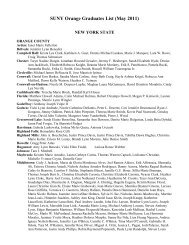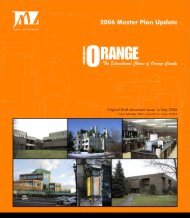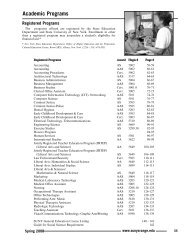You also want an ePaper? Increase the reach of your titles
YUMPU automatically turns print PDFs into web optimized ePapers that Google loves.
Accounting<br />
Accounting<br />
(Business Department)<br />
ACC 101—Accounting Principles 1<br />
4 cr. (Fall/Spring)<br />
This is an introduction to accounting practice and<br />
theory using the model of the sole proprietorship in a<br />
service business. The accounting process for<br />
recording, summarizing, and reporting financial data<br />
is analyzed. Specialized systems in cash controls,<br />
payroll, and the use of multipurpose combination<br />
journals are examined. Emphasis is placed on<br />
identifying and correcting errors and omissions and<br />
understanding their impact on financial statements.<br />
Course objectives are reinforced through the use of<br />
manual and/or computerized practice sets.<br />
Prerequisite: MAT 020 or placement into MAT 101<br />
or higher<br />
ACC 102—Accounting Principles 2<br />
4 cr. (Fall/Spring)<br />
This is a continuation of accounting practice using<br />
the model of the sole proprietorship in a<br />
merchandising business. Use of special purpose<br />
journals and related subsidiary ledgers in support of<br />
merchandising operations and an analysis of<br />
payables, receivables, and inventory valuation unique<br />
to this area are examined. Additional content in the<br />
areas of note financing, long-term assets and payroll<br />
are included. The topic of corporations and the<br />
specific equity issues related to them are discussed.<br />
Course objectives are reinforced through the use of<br />
manual and/or computerized practice sets.<br />
Prerequisite: ACC 101<br />
ACC 111—Personal Finance<br />
3 cr. (Spring-Day/Fall-Evening)<br />
The course examines important aspects of<br />
consumer decision making. Emphasis is on practical<br />
consumer finance areas such as: personal financial<br />
planning, budgeting, consumer protection,<br />
purchasing, taxes, credit and investments. The course<br />
provides the skills to develop a life-long financial plan<br />
for the individual.<br />
Prerequisite: MAT 020 or placement into MAT 101<br />
or higher<br />
ACC 153—Financial Accounting<br />
4 cr.<br />
This course provides a solid foundation in basic<br />
accounting concepts and methodology of financial<br />
accounting. This includes the rules and procedures<br />
used by financial accountants in preparing external<br />
financial reports. Emphasis is placed on the chart of<br />
accounts, the accounting environment, the accounting<br />
cycle, cash flow, the income statement and the balance<br />
sheet. This course provides students with an<br />
understanding of financial accounting in a corporate<br />
environment, methods used to perform analysis of<br />
financial statements, and insights into the financial<br />
accounting decision making process.<br />
Prerequisite: MAT 020 or placement into MAT 101<br />
or higher<br />
ACC 154—Managerial Accounting<br />
4 cr. (Fall/Spring)<br />
This course introduces students to managerial<br />
accounting as an information system that provides<br />
managers with a basis for decision making. Topics<br />
include basic C-V-P analysis, estimating costs, job and<br />
process costing, break-even analysis, standard<br />
costing, short and long term decision making,<br />
responsibility accounting, operating budgets, and<br />
flexible budgeting. Emphasis is placed on the needs of<br />
managers to use internal accounting information to<br />
make business decisions.<br />
Prerequisite: ACC 153 or ACC 101 and ACC 102<br />
ACC 201—Intermediate Accounting 1<br />
4 cr. (Fall-Day/Spring-Evening)<br />
Special emphasis is placed on accounting standards<br />
and the F.A.S.B. bulletins. Topics include: a review of<br />
generally accepted accounting principles; recognition,<br />
valuation and disposition issues; cash and receivables;<br />
inventory flow procedures; plant and intangible<br />
assets; and revenue recognition.<br />
Prerequisite: ACC 154 and BUS 161 or permission<br />
of department<br />
ACC 202—Intermediate Accounting 2<br />
4 cr. (Fall-Evening/Spring-Day)<br />
Continued emphasis is placed on accounting<br />
standards and the F.A.S.B. bulletins. Topics include:<br />
temporary and long-term investments, current<br />
liabilities, stockholders equity, bonds and<br />
miscellaneous long-term liabilities, pension plans,<br />
leases, cash flows, financial statement analysis,<br />
earnings per share, and an introduction into the<br />
objective characteristics and elements of financial<br />
reporting. Use of the Financial Accounting Research<br />
System (FARS) will also be introduced.<br />
Prerequisite: ACC 201<br />
ACC 205—Accounting with Microcomputer<br />
Applications<br />
3 cr. (Fall-Day/Spring-Evening)<br />
Spreadsheet and time value of money software are<br />
introduced and developed as support tools for topics<br />
in managerial, financial, and income tax accounting.<br />
Topics include capital budgeting, cash budgeting,<br />
depreciation, loan/debt/bond amortization, cost/<br />
volume/profit analysis, project development,<br />
financing, and profit planning, and an introduction<br />
into financial planning. Emphasis is placed on both<br />
proper application of theory and quality of report<br />
presentation.<br />
Prerequisite: ACC 102 and BUS 161 or ACC 153<br />
and BUS 161<br />
Spring 2012<br />
www.sunyorange.edu<br />
167



